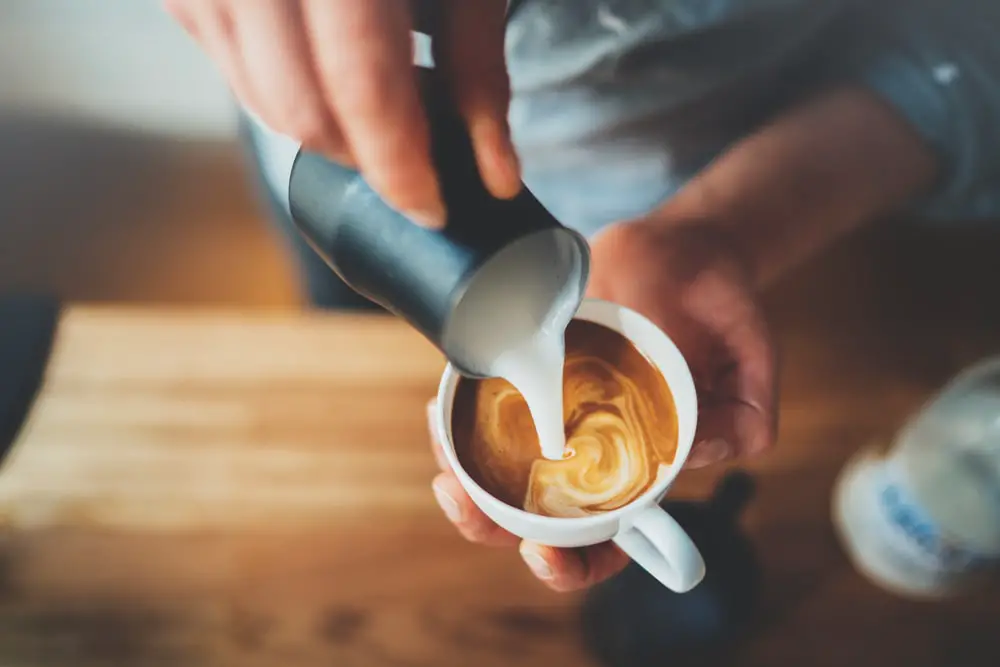Coffee is a popular drink that can be enjoyed in many different ways. There are two main ways to enjoy your coffee- black and with milk. Matcha, latte, cappuccino, macchiato – there are as many variations as there are days of the week! In this article we’ll explore how you can make coffee with milk and why adding milk to your coffee can make for a more enjoyable experience. What do you think? Do you like your coffee with milk or without? Let us know in the comments below.
Can you make coffee with milk?

The answer to this question will depend on whether you mean hot coffee or iced coffee. In case you mean iced coffee, then yes, you can make iced coffee with milk. Whether it’s expresso, latte, cappuccino, macchiato, mocha, or any other coffee, you can make it with milk. In case you want to make coffee with milk for delicious hot coffee, then you will need to use whole milk instead of skimmed or low-fat milk.
What is the difference between coffee with cream and coffee with milk?
Well, it’s not just about fat. While cow’s milk contains more fat than skimmed or low-fat milk, that difference is too small to make any difference in taste. The real difference will be in the texture. Milk makes for a smooth and creamy drink while cream tends to have a thick creamy consistency, which some people prefer over a liquid one. It also won’t go as well with your cereal if you have coffee regularly- you can enjoy both separately!
Can I make coffee with milk for hot coffee?
Yes, of course! Adding milk will alter the taste of your hot drinks but that doesn’t mean that they’ll be bad- some people prefer their beverages on the thicker side while others are happy if their morning brew is almost watery. It’s all about preference.
Why Only Use a French Press?
When someone first wants to attempt making espresso at home with their machine, they should remember that the machine is designed for water instead of milk. So if an individual has a drip machine or a single-cup maker, it wouldn’t be worth their time and energy, in the long run, to use any of these machines for espresso or other coffee drinks with milk. The reason behind this is due to calcium buildup which can occur in the various components inside the machine that brews coffee. By using it as recommended may lead back to difficult cleaning issues as well as even longer-term issues such as hard water build-up.

In addition to this, if you were to try brewing coffee with milk in the coffee maker that you typically brew your morning cup of Joe in, it would not be an appetizing cup of coffee. This is because first off, you wouldn’t have any control over the temperature of the milk. Second, milk is difficult to clean compared to water.
You’ll end up with milk stuck in your machine and it will spoil future brews without some real effort on your part. Alternatively, using a pour-over may lead to improper filtering. The milk could get stuck or take too long to finish filtering and as a result, you wouldn’t have an adequate amount of foam for your coffee.
So, this leaves you with using a french press to brew coffee with milk instead of water. A french press is not the only possibility when it comes down to brewing coffee with milk, but it is by far the most effective and easiest option.
The benefits of adding milk to your coffee
There are a few reasons why adding milk to your coffee can make for a more enjoyable experience. One of the main benefits is that it can add creaminess and sweetness to your cup of joe. It can also help to soften the bitterness of coffee and make it a little bit more filling. Some people also believe that adding milk to your coffee can help to reduce the risk of developing heart disease.
Recipe of making coffee with milk
Prep Time: 2 minutes
Cook Time: 8 minutes
Total Time: 10 minutes
Calories: 49kcal
Ingredients
- 3 Tablespoons of espresso coffee grounds.
- 1/3 Cup of water
- 1-1/3 Cup of milk
- Sugar to taste
Instructions
- Follow the manufacturer’s instructions when putting the coffee in your espresso maker (they vary depending on your coffee maker type).
- Pour in the water. If you’re using a stovetop espresso maker, turn up the heat; if you’re using an electric espresso machine, turn it on.
- Place the milk in a small saucepan and heat on medium-high while the coffee is brewing. Heat the milk, then reduce the heat to keep it simmering once it reaches a boil.
- Pour the coffee into a tall, thick glass, and then pour in the milk in a gentle but quick stream. The coffee/milk mixture will cool down, forming a layer of foam on the top of the glass. After that, sweeten with sugar and drink your coffee with milk!
Nutrition
Calories: 49kcal | Carbohydrates: 3g | Protein: 2g | Fat: 2g | Saturated Fat: 1g | Cholesterol: 8mg | Sodium: 39mg | Potassium: 107mg | Sugar: 4g | Vitamin A: 130IU | Calcium: 92mg
Conclusion
You might be wondering how to make coffee with milk at home. You can easily do this by adding a splash of whole or skimmed milk into your freshly brewed cup before you add the hot water, espresso shots, and other ingredients like sugar. If you’re feeling adventurous, try stirring in flavored syrups or creamers after you’ve made your coffee for added flavor but keep in mind that these additions will change the consistency of your drink so if it’s too thin for your taste buds remember to adjust accordingly! I hope this article has taught you about why adding milk to coffee is beneficial as well as some tips on how to enjoy it best.
